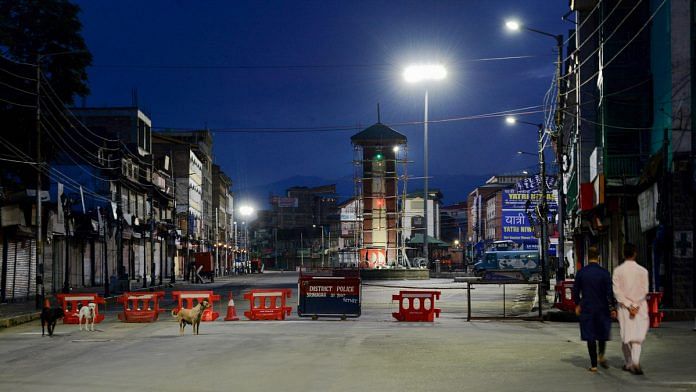On 5 August 2019, the highest temple of Indian democracy betrayed the people of Jammu and Kashmir. That day in Parliament, democracy took the ugly shape of majoritarianism and authoritarianism.
As I wrote in my article in The Kashmir Wallah, if you want to understand how horrible that day was, put yourself in the shoes of the people of Jammu and Kashmir—overnight, they were collectively put in an open-air prison with no means to communicate with each other, forget the outside world. For the first time in my living memory, even landline telephones were disconnected. People of the state were put under the strict watch of 50,000 troops who were brought in addition to the thousands of other security forces who were already deployed in J&K. The people were imprisoned in their houses and many activists, students, politicians, lawyers put in detention. Not even women were spared.
All this was done because the Bharatiya Janata Party (BJP) had to strip J&K off its special status under Article 370, and divide it into two parts. The Narendra Modi government also added insult to injury by downgrading J&K from a state to two Union Territories.
I, like many of my colleagues and fellow people, was put under house arrest. I could not gather myself and believe what had happened.
My feelings reminded me of an old African proverb — the axe forgets, but the tree remembers. Parliament was the axe that day, and we Kashmiris are the trees.
The fate of 12 million people was decided without even consulting them or their representatives.
Also read: There is a strange silence in Kashmir and it spells only misery for students, businesses
Our protest matters
The undemocratic ‘Parliamentary invasion’ of its Constitution on 5 August 2019 not only humiliated the people of J&K but also stripped them of every constitutional right and liberty that they had earned while acceding to Union of India. The move also undermined, discredited and denigrated the mainstream political parties in the state and the sacrifices they had made for the last 30-odd years for the establishment of democracy. Several political leaders and activists had laid down their lives in J&K because they stood for democratic institutions and the principles that India had offered them for the last 70 years. And to add to the irony and insult, the Indian narrative after the unilateral revocation of Article 370 put them in the same line as those who killed them for their ideologies.
The people of J&K and the mainstream political parties now have only two options left. Either give in to the undemocratic might of the powers who orchestrated these events and adapt to the idea of living under their rules, or reject it and dissent.
Dissent is still provided in the Constitution as a democratic right. And if I am not wrong, the BJP has not yet abrogated this provision, and dissent can be expressed in the form of protest. The word protest does not mean violence. Protest is a genuine means of expression in a democracy.
The word protest is multidimensional. MK Gandhi, Jawaharlal Nehru, and many other freedom fighters had protested against the British rule of India. They protested in streets, in institutions, and through different methods. Boycott of British products and jobs was one of them. In independent India, the earlier avatar of BJP, the Jana Sangh protested before and during Indira Gandhi’s Emergency in the streets and elsewhere. The BJP protested in the streets against the former UPA government. Many such BJP leaders are now part of the Modi government. People of India who believe in the principles of democracy and the Constitution came out in thousands against the Citizenship (Amendment) Act and the planned National Register of Citizens. Farmers in Punjab and from many other states are protesting to secure their rights.
Every free society and democracy allows and respects the right to protest and adopts it as a peaceful means of dissent.
Also read: Pro-India Kashmiris more or less hated here, but Delhi won’t hear the truth: Farooq Abdullah
Protest is not a bad word. Authoritarian leaders have made it ‘bad’ to suppress dissent. Protest does not mean violence. I will never endorse violence of any sort. We the people of Kashmir have seen the effect of violence. We are the worst sufferers of it and have lived its pain. I, like many fellow citizens of J&K, have been the victim of violence. I lost my father to a powerful IED blast when he was only 43. I feel and relate to the pain of the families when a life is lost to bullets from any side. I do not and shall not ever endorse violence.
The people of J&K, to the best of my understanding, will not give in to this unjust and humiliating abrogation of 370. It is now for the mainstream political parties to realise that it is not about power anymore. It is not even about credibility. It is about our collective survival.
The author is a senior leader of the Jammu and Kashmir National Conference (JKNC) and former cabinet minister. Until recently, he was chief spokesperson of the party. Views are personal.
(Edited by Neera Majumdar)



